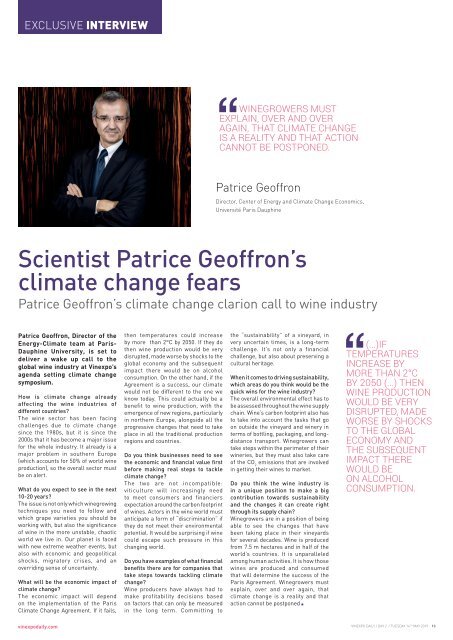Vinexpo Daily 2019 - Day 2 Edition
Create successful ePaper yourself
Turn your PDF publications into a flip-book with our unique Google optimized e-Paper software.
EXCLUSIVE INTERVIEW<br />
WINEGROWERS MUST<br />
EXPLAIN, OVER AND OVER<br />
AGAIN, THAT CLIMATE CHANGE<br />
IS A REALITY AND THAT ACTION<br />
CANNOT BE POSTPONED.<br />
Patrice Geoffron<br />
Director, Center of Energy and Climate Change Economics,<br />
Université Paris Dauphine<br />
Scientist Patrice Geoffron’s<br />
climate change fears<br />
Patrice Geoffron’s climate change clarion call to wine industry<br />
Patrice Geoffron, Director of the<br />
Energy-Climate team at Paris-<br />
Dauphine University, is set to<br />
deliver a wake up call to the<br />
global wine industry at <strong>Vinexpo</strong>’s<br />
agenda setting climate change<br />
symposium.<br />
How is climate change already<br />
affecting the wine industries of<br />
different countries?<br />
The wine sector has been facing<br />
challenges due to climate change<br />
since the 1980s, but it is since the<br />
2000s that it has become a major issue<br />
for the whole industry. It already is a<br />
major problem in southern Europe<br />
(which accounts for 50% of world wine<br />
production), so the overall sector must<br />
be on alert.<br />
What do you expect to see in the next<br />
10-20 years?<br />
The issue is not only which winegrowing<br />
techniques you need to follow and<br />
which grape varieties you should be<br />
working with, but also the significance<br />
of wine in the more unstable, chaotic<br />
world we live in. Our planet is faced<br />
with new extreme weather events, but<br />
also with economic and geopolitical<br />
shocks, migratory crises, and an<br />
overriding sense of uncertainty.<br />
What will be the economic impact of<br />
climate change?<br />
The economic impact will depend<br />
on the implementation of the Paris<br />
Climate Change Agreement. If it fails,<br />
then temperatures could increase<br />
by more than 2°C by 2050. If they do<br />
then wine production would be very<br />
disrupted, made worse by shocks to the<br />
global economy and the subsequent<br />
impact there would be on alcohol<br />
consumption. On the other hand, if the<br />
Agreement is a success, our climate<br />
would not be different to the one we<br />
know today. This could actually be a<br />
benefit to wine production, with the<br />
emergence of new regions, particularly<br />
in northern Europe, alongside all the<br />
progressive changes that need to take<br />
place in all the traditional production<br />
regions and countries.<br />
Do you think businesses need to see<br />
the economic and financial value first<br />
before making real steps to tackle<br />
climate change?<br />
The two are not incompatible:<br />
viticulture will increasingly need<br />
to meet consumers and financiers<br />
expectation around the carbon footprint<br />
of wines. Actors in the wine world must<br />
anticipate a form of “discrimination” if<br />
they do not meet their environmental<br />
potential. It would be surprising if wine<br />
could escape such pressure in this<br />
changing world.<br />
Do you have examples of what financial<br />
benefits there are for companies that<br />
take steps towards tackling climate<br />
change?<br />
Wine producers have always had to<br />
make profitability decisions based<br />
on factors that can only be measured<br />
in the long term. Committing to<br />
the “sustainability” of a vineyard, in<br />
very uncertain times, is a long-term<br />
challenge. It’s not only a financial<br />
challenge, but also about preserving a<br />
cultural heritage.<br />
When it comes to driving sustainability,<br />
which areas do you think would be the<br />
quick wins for the wine industry?<br />
The overall environmental effect has to<br />
be assessed throughout the wine supply<br />
chain. Wine’s carbon footprint also has<br />
to take into account the tasks that go<br />
on outside the vineyard and winery in<br />
terms of bottling, packaging, and longdistance<br />
transport. Winegrowers can<br />
take steps within the perimeter of their<br />
wineries, but they must also take care<br />
of the CO 2<br />
emissions that are involved<br />
in getting their wines to market.<br />
Do you think the wine industry is<br />
in a unique position to make a big<br />
contribution towards sustainability<br />
and the changes it can create right<br />
through its supply chain?<br />
Winegrowers are in a position of being<br />
able to see the changes that have<br />
been taking place in their vineyards<br />
for several decades. Wine is produced<br />
from 7.5 m hectares and in half of the<br />
world’s countries. It is unparalleled<br />
among human activities. It is how those<br />
wines are produced and consumed<br />
that will determine the success of the<br />
Paris Agreement. Winegrowers must<br />
explain, over and over again, that<br />
climate change is a reality and that<br />
action cannot be postponed<br />
(...)IF<br />
TEMPERATURES<br />
INCREASE BY<br />
MORE THAN 2°C<br />
BY 2050 (...) THEN<br />
WINE PRODUCTION<br />
WOULD BE VERY<br />
DISRUPTED, MADE<br />
WORSE BY SHOCKS<br />
TO THE GLOBAL<br />
ECONOMY AND<br />
THE SUBSEQUENT<br />
IMPACT THERE<br />
WOULD BE<br />
ON ALCOHOL<br />
CONSUMPTION.<br />
vinexpodaily.com<br />
VINEXPO DAILY / DAY 2 / TUESDAY 14 TH MAY <strong>2019</strong> 13

















